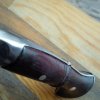- Joined
- Nov 11, 2013
- Messages
- 1,976
I'm a big fan of Chiruwa (full tang) handles mainly because I might have a false sense of security.
I say false sense of security because the kuks I use/beat the most are mainly standard rat tails and I never had any of these fail or loosening up.
This morning I decided to open the collection box to appreciate each pieces carefully. It's been a while since I did it.
Ouch! some of the handles are suffering from serious shrinking.
This one is the worst of them all:

The rat tails handles also shrink but it seams much less apparent. My oldest Kukri is a standard rat tail and once in a while I file the metal but cap to match the handle size and that's it.
I must say I'm the one to blame because these pieces are known to shrink and need proper love and maintenance to keep them healthy.
Our local knifemakers are well aware of this issue and use either synthetic, stabilized or much older natural material that had plenty of time to set (all less prone to shrinkage). But they will also charge 3, 4, 5 times and more than the price of the blades we are getting from Nepal.
The piece in the picture is one I like enough to consider a re-handling job by a professional. Even if I include this additional cost, I still think the product well worth every penny I invested in it.
But it got me go hmmmmmmm. Next time, I will think twice before I jump on a Chiruwa handle Kuk and if I go for it, I'll pay more attention to the handle material.
So here's my request to you guys - HI uses antler, bones, horns and all sort of woods.
Have you notice which woods and other natural material shrink most or less than others?
Thanks for your inputs
I say false sense of security because the kuks I use/beat the most are mainly standard rat tails and I never had any of these fail or loosening up.
This morning I decided to open the collection box to appreciate each pieces carefully. It's been a while since I did it.
Ouch! some of the handles are suffering from serious shrinking.
This one is the worst of them all:

The rat tails handles also shrink but it seams much less apparent. My oldest Kukri is a standard rat tail and once in a while I file the metal but cap to match the handle size and that's it.
I must say I'm the one to blame because these pieces are known to shrink and need proper love and maintenance to keep them healthy.
Our local knifemakers are well aware of this issue and use either synthetic, stabilized or much older natural material that had plenty of time to set (all less prone to shrinkage). But they will also charge 3, 4, 5 times and more than the price of the blades we are getting from Nepal.
The piece in the picture is one I like enough to consider a re-handling job by a professional. Even if I include this additional cost, I still think the product well worth every penny I invested in it.
But it got me go hmmmmmmm. Next time, I will think twice before I jump on a Chiruwa handle Kuk and if I go for it, I'll pay more attention to the handle material.
So here's my request to you guys - HI uses antler, bones, horns and all sort of woods.
Have you notice which woods and other natural material shrink most or less than others?
Thanks for your inputs
